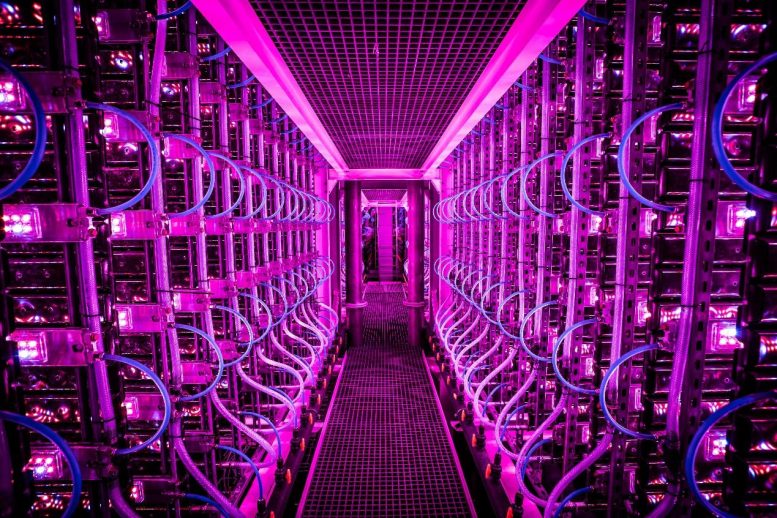
The analysis finds that for every kilogram of beef meat replaced with a kilogram of Spirulina, one can save nearly 100 kilograms of greenhouse gas emissions, 340 square meters of land, and 1,400 liters of water.
In a recent study led by Dr. Asaf Tzachor, a researcher at Reichman University’s School of Sustainability, it has been suggested that Iceland could play a key role in the future of food production. The analysis highlighted a cutting-edge facility in Iceland that cultivates Spirulina algae, a highly nutritious source of protein, iron, and essential fatty acids.
A new study, led by Dr. Asaf Tzachor in collaboration with an international team of scientists, has evaluated a state-of-the-art biotechnology system that grows Spirulina. The system, developed and run by Vaxa Impact Nutrition, is located at the ON Power Geothermal Park in Iceland, and takes advantage of resources available through the Hellisheidi power station, including renewable electricity for lighting and power usage, hot and cold water streams for temperature control, freshwater for cultivation, and carbon dioxide for biofixation.
The research team found that the nutritional quality of the Spirulina produced by this system is superior to that of beef in terms of protein, essential fatty acids, and iron, and can serve as a healthy, safe, and more sustainable alternative to meat in daily diets.

Biotechnology company Vaxa’s facility in Iceland, which operates the production system. Credit: Pétur Gunnarsson, Vaxa Iceland
According to the study, for every kilogram of beef meat replaced with Icelandic Spirulina, consumers will save some 1,400 liters of water, 340 square meters of fertile land, and nearly 100 kilograms of greenhouse gases emitted into the atmosphere. Moreover, the algae may be consumed in different forms, including as wet biomass, or in the form of paste, powder, or pill. For example, one can use Icelandic Spirulina powder as an ingredient in pasta, pancakes, and pastries, or drink an Icelandic Spirulina shake.
While the role of meat in human diets has been instrumental, its ecological footprint is considerable and detrimental. Raising beef cattle requires arable lands and feedstocks, and emits greenhouse gases into the atmosphere contributing to climate change and global warming One kilogram of beef requires approximately 1,450 liters of water and 340 square meters of fertile land. Moreover, the production of one kilogram of beef meat results in the emission of about 100 kilograms of greenhouse gases.

Dr. Asaf Tzachor from the School of Sustainability at Reichman University. Credit: Gilad Kavalerchik
As the demand for animal-source proteins grows, so do the damages caused by the livestock sector. As a response, humanity is searching for novel ways to ensure its nutritional security, including the supply of alternative protein sources, vitamins, and essential minerals.
Algae, especially Spirulina, are considered among the most effective food producers on earth and can be cultivated using different techniques. In this study, Spirulina is cultivated in closed, controlled systems, using advanced photonic management methods (controlled exposure to desired wavelengths), entirely isolated from the harsh Icelandic environment.
This biotechnology system is exceptionally resilient to fluctuations in environmental and climatic conditions. It can be deployed in a modular fashion in different regions of the world. Moreover, Spirulina is an autotrophic organism and is dependent on photosynthesis and a supply of carbon dioxide. Thus, unlike many other alternative protein sources, cultivating this food source removes greenhouse gases from the atmosphere and mitigates climate change.
Dr. Asaf Tzachor, from the School of Sustainability at Reichman University: “Nutritional security, climate change mitigation, and climate change adaptation can go hand in hand. All consumers must do is adopt a bit of Icelandic Spirulina into their meals and diets instead of beef meat. It’s healthier, safer, and more sustainable. Whatever change we wish to see in the world should be manifested in our dietary choices.”
Reference: “Environmental Impacts of Large-Scale Spirulina (Arthrospira platensis) Production in Hellisheidi Geothermal Park Iceland: Life Cycle Assessment” by Asaf Tzachor, Asger Smidt-Jensen, Alfons Ramel and Margrét Geirsdóttir, 7 September 2022, Marine Biotechnology.
DOI: 10.1007/s10126-022-10162-8
Want To Eat Healthy and Save the Planet? Scientists Recommend Replacing Beef With This - SciTechDaily
Read More

No comments:
Post a Comment